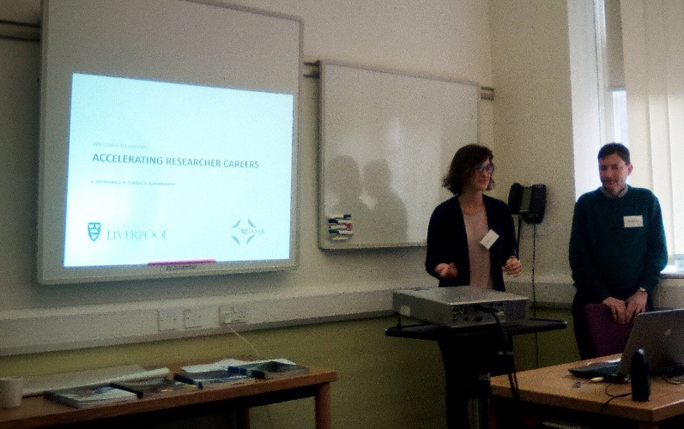OMA training programme presented at Learning and Teaching Conference in Liverpool

The purpose of the annual Learning and Teaching Conference at the University of Liverpool is to share good practice from around the institution, raise awareness of the quality of teaching taking place and provide a forum for staff to present new ideas on learning, teaching and assessment for discussion with fellow practitioners.
OMA partners from the University of Liverpool and the University of Manchester led a session on ‘Accelerating researchers’ career’. Dr. Ricardo Torres and Dr. Alexandrova, both from the University of Liverpool/Cockcroft Institute, were joined by Ewa Oponowicz, OMA fellow from the University of Manchester, to discuss the training and career of early stage researchers.
In the session chaired by Ewa Oponowicz, Dr. Ricardo Torres from the Project T.E.A.M. presented an overview of the postgraduate training model developed within several Marie Sklodowska – Curie European training networks that have been initiated and coordinated by the University of Liverpool/Cockcroft Institute, as well as discussed different career models chosen by young researchers from these networks. Dr. Alexandra Alexandrova, a former fellow of the LA3NET network, presented her own career path, which combines the experiences of academia and industry, as she decided to set up a spin-off company D-beam following her Marie Sklodowska-Curie fellowship. Presentations were followed by questions from the audience and an informal debate.
Since 2008, Prof Carsten Welsch with support from his Project T.E.A.M., has coordinated five EU-funded Innovative Training Networks in the field of particle accelerators. OMA – Optimization of Medical Accelerators is one of them. Each international network brings together universities, research centres and private companies to create an interdisciplinary environment for cutting-edge research. In addition, they target the training of more than a dozen early career researchers, so-called Fellows. A cohort of Fellows is hosted at several institutions across Europe where they benefit from a broad and interdisciplinary training provided by their local host institute and the network as a whole. The successful model developed over the years includes international training events, cross-sector secondments, and complementary skills training, as well as various outreach activities. As a result, a steady supply of highly qualified researchers has been provided to the international community of particle accelerator experts. The projects have also helped raise public awareness of the importance of accelerators for science in society.